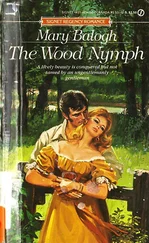C. Brittain - The Wood Nymph, the Cranky Saint
Здесь есть возможность читать онлайн «C. Brittain - The Wood Nymph, the Cranky Saint» весь текст электронной книги совершенно бесплатно (целиком полную версию без сокращений). В некоторых случаях можно слушать аудио, скачать через торрент в формате fb2 и присутствует краткое содержание. Жанр: Фэнтези, на английском языке. Описание произведения, (предисловие) а так же отзывы посетителей доступны на портале библиотеки ЛибКат.
- Название:The Wood Nymph, the Cranky Saint
- Автор:
- Жанр:
- Год:неизвестен
- ISBN:нет данных
- Рейтинг книги:4 / 5. Голосов: 1
-
Избранное:Добавить в избранное
- Отзывы:
-
Ваша оценка:
- 80
- 1
- 2
- 3
- 4
- 5
The Wood Nymph, the Cranky Saint: краткое содержание, описание и аннотация
Предлагаем к чтению аннотацию, описание, краткое содержание или предисловие (зависит от того, что написал сам автор книги «The Wood Nymph, the Cranky Saint»). Если вы не нашли необходимую информацию о книге — напишите в комментариях, мы постараемся отыскать её.
The Wood Nymph, the Cranky Saint — читать онлайн бесплатно полную книгу (весь текст) целиком
Ниже представлен текст книги, разбитый по страницам. Система сохранения места последней прочитанной страницы, позволяет с удобством читать онлайн бесплатно книгу «The Wood Nymph, the Cranky Saint», без необходимости каждый раз заново искать на чём Вы остановились. Поставьте закладку, и сможете в любой момент перейти на страницу, на которой закончили чтение.
Интервал:
Закладка:
As I started back toward the grove, I hesitated again. This was not where I had seen the rabbits disappear. How many of them might there be?
When I came back into the grove, the denseness of magical forces made me lose track of the spell that had seemed so strong a moment ago. I walked swiftly along the little paths between the springs, without seeing anything but trees. But then something caught my eye in the muddy earth.
It was a footprint, about the size of a man’s foot, even roughly the right shape, but somehow wrong. I knelt down for a closer look, but I already knew. That print had been made by nothing human.
PART TWO — THE YOUNG WIZARD
I
Back at the shrine, Joachim and the hermit were still talking. I hesitated, not liking to mention the wood nymph before the hermit, and certainly not wanting to terrify him with the horned rabbits or that inhuman footprint.
But the hermit beckoned me to join them. “Your chaplain’s been trying to tell me that Saint Eusebius has appeared to some priests in a vision, asking to leave the grove, but I’m sure they’re mistaken. Perhaps they are not aware of the miracle that occurred only a year after the saint’s death.”
I sat down at the hermit’s feet, willing to listen while waiting for my mind to come up with better ideas than I had now.
“You’ve doubtless heard that a reliquary was made immediately after the saint’s death,” continued the hermit, “to contain all of his mortal remains that had not been eaten by the dragon. You do know about the dragon?”
“Yes, I know that story.”
He smiled approvingly. “One sometimes hears that wizards are too dismissive towards concerns of the church, or even laugh at them, but I’ve never felt that myself.”
I tried not to meet either his eyes or Joachim’s.
“And so for a year,” the hermit continued, “the holy toe was peacefully kept here, at a shrine built onto the side of the little hermitage where the saint had spent his days-in fact, this very hermitage where I now live. One of Eusebius’s pupils lived there as a hermit in obedience to his master’s precepts.
“But one day three priests arrived in the grove. They said they had come from the church where Eusebius had originally been made a priest and that they intended to take his holy relics back with them! The young hermit, as you can imagine, almost went mad with despair, and he fell on his face in the mud before the shrine and begged Saint Eusebius, his old master, not to leave him.
“And the saint heard his prayer. For when the three priests tried to lift the reliquary, they found it so heavy they could not budge it. They went for a block and tackle and tried again, but they themselves were hurled into the pool from the strain. And yet when the young hermit lifted the reliquary, it was as light as a feather in his hand. And thus the saint showed that he wanted to stay here, rather than going back to the city he had purposely left behind him. And after all these centuries, after generations of hermits of which I am the last and the least worthy, he has not changed his mind.”
I nodded, impressed in spite of myself.
“As I already told you,” Joachim said quietly, “he seems to have changed his mind now. The letter the bishop received said that the saint was ‘fed up’ with having his relics here.”
The hermit turned his smile on the chaplain. “Excuse me, Father, if I tend to discount the testimony of priests who spend their days on secular concerns. I’m sure they mistook his meaning. I realize the saint expresses himself forcibly at times-and error must always be rebuked firmly, as our Lord showed when He drove the money-changers from the Temple-but when he has appeared to me, it has always been with a gentle face and a willingness to be my guide.”
“Then I’ll tell this to the bishop,” said Joachim, rising to his feet. I was glad of the excuse to stand up as well; the damp moss on which I was sitting had started soaking through my trousers.
After the chaplain and the hermit exchanged final expressions of esteem and reverence, we picked our way back down the steep path by the waterfall to where we had left the horses. I surreptitiously looked for footprints in the mud and saw none but our own.
“Will this settle it?” I asked. “Will the priests who wanted the saint’s relics take the hermit’s word that the saint doesn’t want to leave?”
“It depends on whether the bishop takes the hermit’s word for it,” said Joachim distractedly. He pulled the lunch out of his saddle bag and started eating, but not as though he tasted it. “Did you find the wood nymph, then?”
“I found her and even tried to speak to her, but she wouldn’t answer.”
“That’s something else the bishop was worried about. He feels that it has been a mistake having both a saint’s shrine and a nymph share the same grove all these centuries. The modern Church needs to eradicate all remnants of superstition, and the uneducated may find it a stumbling block to their faith if they come to worship God and His saints and find themselves in the realm of a wood nymph.”
“Especially one as lovely as she is,” I provided.
Joachim gave me a quick look. “I think the bishop knows better than that,” he said, answering a question I had not directly asked. “There has never been the least doubt about the moral purity of this hermit-or any of his predecessors. But wood nymphs, as I understand it, are immortal, and thus they are outside of the human drama of sin and salvation.”
And so, I thought, was whatever had made that footprint.
Joachim hesitated for a moment before continuing. “I’ve mentioned before,” he said at last, “that the bishop is very uneasy about my friendship with a wizard. But I wrote him that, in this case, it could be advantageous to have access to someone who might be able to influence a nymph. Therefore,” with a sideways glance from his enormous eyes, “I do hope you can do something.”
I said nothing for a moment but thought about this. The bishop seemed to have issued the chaplain a veiled threat: either I proved my ability and willingness to help the church, or else the bishop would pressure Joachim to end our friendship. I thought of suggesting that, if the bishop became angry with him, then he could stop worrying about being asked to join the cathedral chapter, but decided this would push him too far.
Instead I said, “I’ll try my best, but it may be hard if the nymph won’t even talk to me. I’ll want to consult my books, back at the royal castle, perhaps talk to my predecessor about her, and maybe even telephone the wizards’ school. They don’t want young wizards calling them up with every little problem, but if my books don’t give me much help I may have no choice.”
Joachim had started to mount his horse, but he seemed to hear something in my voice I had not meant him to hear. He swung back down and looked at me. “I’m sorry. I was thinking of the need to get back to the count’s castle, to send the bishop a message by the pigeons immediately. But he can wait a little while longer. What’s really bothering you about the wood nymph?”
“It’s not the nymph,” I said. “It’s something else I saw.” And I told him about the horned rabbits, the footprint that was almost, but not quite, a man’s, and the strange sense of renegade spells lurking amid the magic of the valley.
“So I know now the horned rabbits aren’t creatures from the land of wild magic,” I finished. “It looks as though someone took dead rabbits, attached sheep’s horns, and then, I don’t know how, brought them back to life. Some wizard must have made them. But my predecessor and I are the only wizards in the kingdom.”
Читать дальшеИнтервал:
Закладка:
Похожие книги на «The Wood Nymph, the Cranky Saint»
Представляем Вашему вниманию похожие книги на «The Wood Nymph, the Cranky Saint» списком для выбора. Мы отобрали схожую по названию и смыслу литературу в надежде предоставить читателям больше вариантов отыскать новые, интересные, ещё непрочитанные произведения.
Обсуждение, отзывы о книге «The Wood Nymph, the Cranky Saint» и просто собственные мнения читателей. Оставьте ваши комментарии, напишите, что Вы думаете о произведении, его смысле или главных героях. Укажите что конкретно понравилось, а что нет, и почему Вы так считаете.












